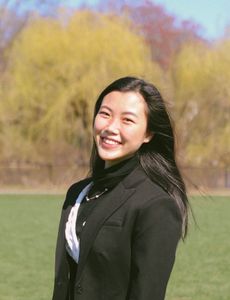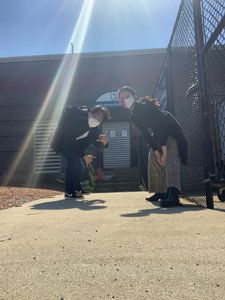Working Toward a Zero Waste Future
By Meghan Bohannon
What if businesses partnered together to turn their waste into reusable resources, rather than letting that waste go to landfills? With the help of the First Year Innovation Fellowship at Innovate@BU, Rachel Koh (CGS ’22, Questrom ‘24) is working on turning this idea, her brain child, into a fully operating project.
The idea was born during Koh’s gap semester when she scrolled through social media and saw Instagram ads for sustainable brands. From this, she came up with the idea for a sustainable sourcing tool that would connect companies wanting to go zero-waste.

“I thought reducing waste through a circular economy model based on relationships between different types of companies, would be a really interesting idea,” said Koh, who is currently pursuing degrees in sustainable business and sustainable energy.
Growing up in Borneo, the third largest island in the world, Koh was constantly surrounded by biodiversity and rainforest culture, which also sparked her passion for the idea. She believes her project will positively impact the environment through decreasing waste from landfills, carbon emissions, and excess energy use, while also helping small businesses reduce the cost of raw materials.
Koh applied to the First Year Innovation Fellowship with a 60-second animated video presenting her idea. Once she was accepted, she began moving forward as part of a first-year innovation cohort in which she was paired with other students working on their own projects.
At Innovate@BU, Koh was paired with mentors who helped her connect to industry professionals and improve her idea. She found the mentorship program to be helpful, especially in the process of creating a business plan.
A typical week in the gap semester for Koh involved five to eight hours of research towards her idea which included lectures, seminars, and documentaries.
“I really wanted to learn the specifics of the recycling gap issue before I started on anything. If you create a solution without understanding the problem, what’s the point?” Koh said.
Once she arrived on campus in the spring, Koh worked on recruiting a team, which was composed of people whom she met through her professional business fraternity, Alpha Kappa Psi, her living-learning community, Earth House, and through her church. Some of her team members come from other universities, including Tufts, Fordham University, and the University of California at San Diego.
“I think it’s really special when you see somebody’s eyes light up with a passion for your idea and want it to happen just as much as you do.” Koh said. “There’s so much uncertainty that comes with forming a start-up, ideas constantly change and evolve. Sometimes you doubt too: you don’t know if your idea is actually going to be impactful or if it’s even going to happen.”
While Koh exercises her passion for sustainability with Innovate@BU, she says the program gave her the connections to live in Earth House, a living and learning community at BU where she has been able to carry out further environmental research.
In addition to gaining funding from Innovate@BU, BU Sustainability has provided Koh with financial support as well. Koh’s projects have won two $500 Sustainability Innovation Seed Grant from BU Sustainability, which have opened up doors for her as the project evolves.

During the Spring semester, Koh and her team were able to make partnerships with companies such as Goodwill. With this came the opportunity to tour the Goodwill headquarters and learn more about how they manage their waste.
Koh, who began her journey during her gap semester, gave advice to next year’s first-year CGS students on getting involved as widely and as early as possible at BU.
“If you’re even mildly interested in something, just go for it! Submit an application, there’s nothing to lose and by putting yourself out there, you open the doors to so many opportunities,” she said.